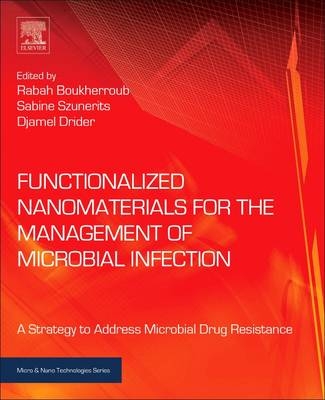
Functionalized Nanomaterials for the Management of Microbial Infection
Elsevier - Health Sciences Division (Verlag)
978-0-323-41625-2 (ISBN)
The use of nanotechnology is currently the most promising strategy to overcome microbial drug resistance. This book shows how, due to their small size, nanoparticles can surmount existing drug resistance mechanisms, including decreased uptake and increased efflux of the drug from the microbial cell, biofilm formation, and intracellular bacteria. In particular, chapters cover the use of nanoparticles to raise intracellular antimicrobial levels, thus directly targeting sites of infection and packaging multiple antimicrobial agents onto a single nanoparticle.
Rabah Boukherroub is Research Director Group Leader at the Institute of Electronics, Microelectronics and Nanotechnology, University of Lille, France. His research interests are in the area of synthesis of functional nanomaterials (metal and semiconductor nanoparticles, semiconductor nanowires, graphene, carbon dots, etc.), surface chemistry, and photophysics of semiconductor/metal nanostructures with emphasis on biosensors and lab-on-chip applications, drug delivery, and development of new tools for studying molecular dynamics in vivo. Sabine Szunerits is since 2009 Professor in Chemistry at the University Lille 1, France and was nominated 2011 as member of the “Institut universitaire de France (IUF). Her current research interests are in the area of material science with emphasis on the development of novel analytical platforms and interfaces for the study of affinity binding events and in the modification of nanostructures (diamond particles, magnetic particles, nanographene) for biomedical applications. She is co-author of more than 230 research publications, wrote several book chapters and has 6 patents Djamel Drider is full professor of Microbiology at Lille 1 University Sciences and Technologies. D. Drider obtained his PhD from Montpellier School of Agriculture and completed his postdoctoral training at Centro de Investigaciones Biologicas (Madrid, Spain) and Mount Sinai School of Medicine of New York University (USA). D. Drider was hired as Associate Professor at Nantes-Atlantic College of Veterinary Medicine; Food Science and Engineering (France). His research is mainly dedicated to antimicrobial peptides mainly those produced by lactic acid bacteria (bacteriocins).
1. Resistance to Antibiotics and Antimicrobial Peptides: A Need of Novel Technology to Tackle This Phenomenon 2. The Role of the Food Chain in the Spread of Antimicrobial Resistance (AMR) 3. Penetrating the Bacterial Biofilm: Challenges for Antimicrobial Treatment 4. Metal Nanoparticles for Microbial Infection 5. Lipid-Based Nanopharmaceuticals in Antimicrobial Therapy 6. Organic Polymeric Nanomaterials as Advanced Tools in the Fight Against Antibiotic-Resistant Infections 7. Bacteriocins and Nanotechnology 8. Graphene-Microbial Interactions
| Erscheinungsdatum | 12.01.2017 |
|---|---|
| Reihe/Serie | Micro & Nano Technologies |
| Verlagsort | Philadelphia |
| Sprache | englisch |
| Maße | 191 x 235 mm |
| Gewicht | 1250 g |
| Themenwelt | Medizin / Pharmazie ► Physiotherapie / Ergotherapie ► Orthopädie |
| Technik ► Medizintechnik | |
| ISBN-10 | 0-323-41625-X / 032341625X |
| ISBN-13 | 978-0-323-41625-2 / 9780323416252 |
| Zustand | Neuware |
| Haben Sie eine Frage zum Produkt? |
aus dem Bereich


